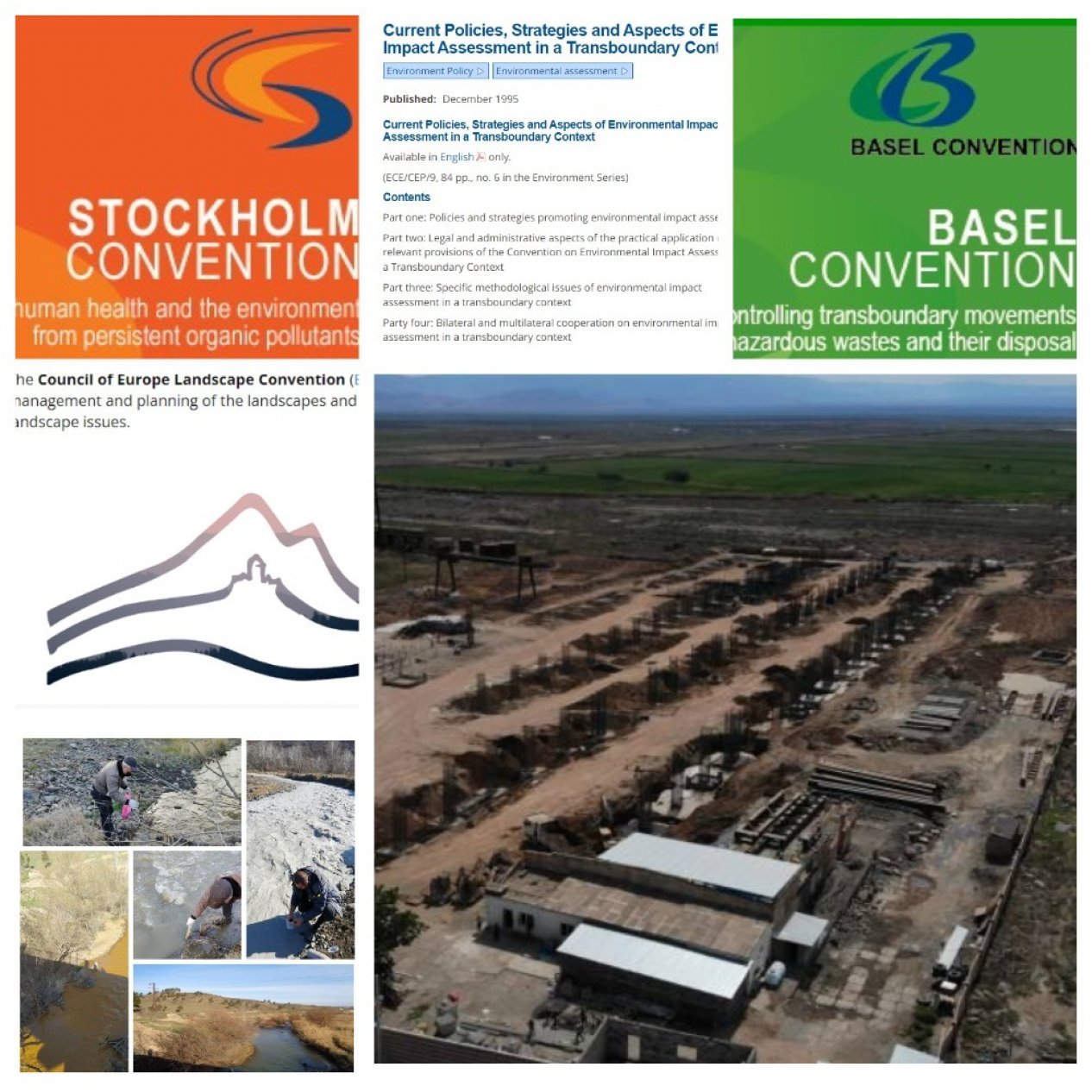
Recently, Azerbaijani environmental NGOs protested due to the construction of a large metallurgical plant in Armenia near the borders of the Nakhchivan Autonomous Republic in the Yeraskh village of, Ararat province (formerly Arazdayan - ed.). According to the Armenian media, the metallurgical production will be launched by the Armenian-American enterprise GTB STEEL, which was established in Armenia last year. The enterprise has already passed all EIA procedures (environmental impact assessment) and will be equipped with modern production facilities.
The Minister of Economy of Armenia Vahan Kerobyan on his Facebook page presented videos from the area where the construction of the metallurgical plant was carried out and announced that the plant in Yeraskh (Arazdayan) will produce ferrous metal, fittings, steel angles and pipes. Annual production volume will reach 180,000 tons. With the launch of the production process, 1,000 jobs will be created at the plant. The total cost of the project is estimated at $70 million. The plant will be built in Yeraskh on an area of 16,500 sq.m. According to the State Register of Legal Entities of Armenia, GTB STEEL was founded in the summer of 2022. The owners of the enterprise are a US citizen of Indian origin Bobby Singh Kang and Armenian citizen Nono Sargsyan. The director of the enterprise is Tigran Hakobyan.
A question arises whether the metallurgical plant under construction by Armenia will harm the environment and whether the conclusion of the EIA meets international standards.
Faktyoxla Lab. tried to clarify the matter.
Firstly, the GTB STEEL plant will have its own smelting shops and will mainly produce fittings, angles and pipes. The smelting process will be carried out in an electric arc furnace, which involves processing the metal at extremely high temperatures. It is planned that the plant will process 180,000 tons of ferrous scrap per year. Recycling of ferrous metals is one of the most complex processes in terms of environmental impact. source

Studies and reports prepared by international environmental research institutes confirm that the amount of toxic gases emitted into the air during the scrap metal smelting process is increasing excessively, and the level of pollution in the area will soar. The metallurgical industry ranks first among industrial enterprises in terms of environmental pollution. In this industry, the amount of substances that have a toxic effect on living organisms significantly exceeds the norm in solid and liquid waste generated during processing and delivery. For example, only 40% of salts of non-ferrous and heavy metals, blast-furnace gas and coke oven gas, formed in the waste products of metallurgical production, are utilized or neutralized, and the rest is emitted into the atmosphere.
Therefore, in world practice, enterprises for the extraction and processing of iron and metals are located at a distance of 20-30 km from residential areas so as not to harm the health of people living nearby. source
Armenia has located the metallurgical complex 4-5 kilometers from the residential areas of Azerbaijan. That is, this means that the plant that GTB STEEL is building will have extremely dire consequences for the environment and human health. Once the plant is operational, the lives of thousands of people will be in serious danger as a result of the violation of the ecosystem of residential areas in the Araz River zone and air pollution with toxic waste. The fact that this region is located near the settlements of the Sadarak district of Nakhchivan means that the life and health of Azerbaijani citizens will face serious consequences in the future.
After all, the village of Arazdayan in the Vedibasar region, which is the historical territory of Azerbaijan, is located on the banks of the Araz River and in close proximity to several residential areas of Nakhchivan.
Another reason why this plant is dangerous is the prediction that the waste from the plant will be dumped into the Araz River. Armenians have been polluting the Shir Arkhi, a tributary of the Araz River, with various industrial waste for years. The construction of a metallurgical plant will lead to a further increase in waste, and the pollution of the Araz River will reach the level of an ecological crisis.
Although Armenia claims that the project will not hurt the environment, the barbaric attitude of Armenians towards the ecology of Azerbaijan during the occupation of Azerbaijani territories indicates that environmental crimes will continue after the construction of the new metallurgical plant.
It is because Azerbaijan has experienced and continues to experience the ecological terror of Armenia on the example of several enterprises that were put into operation before the metallurgical plant that is currently under construction. The negative impact of the Metsamor NPP on the environment is known. Or the use of the Sarsang reservoir as an environmental weapon, the deliberate pollution of the Araz River, one of the main water sources of Azerbaijan, which flows through Armenia, and countless other crimes confirm this. link
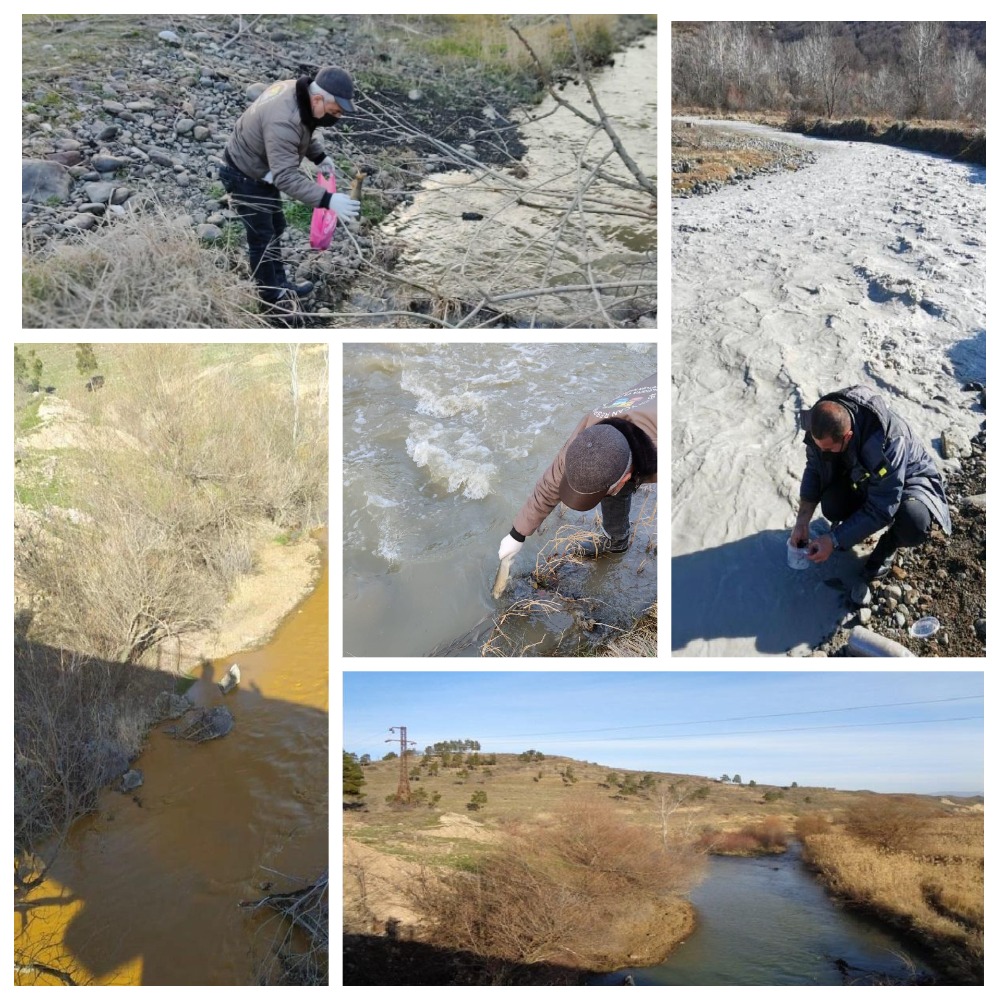
Let's reiterate. The attitude of the Armenian side to the environment, and especially to the environmental well-being of neighboring countries, is well known. After the 44-day war, the Azerbaijani side received enough evidence of targeted sabotage and destruction of the environment by Armenian enterprises. A vivid example of this is the fate of the small river Okhchuchay, flowing from Western Zangazur to Zangilan. The Zangazur copper-molybdenum plant located on the other side of the border turned the river into a collector for dumped chemical waste and slag. The transboundary Okhchuchay was polluted on the territory of Armenia with waste from the Gafan and Gajaran mining industries. Industrial wastewater was discharged into the river untreated, although it contained substances hazardous to human health. The purification facilities of the enterprise were outdated, and the German management company was in no hurry to fork out. There are frequent accidents at the plant. The last one happened in April of this year due to a power outage. There was a failure in the operation of the processing plant, including the regulated flow of industrial water through the tailing pipeline. And such accidents are not uncommon.
The saddest thing is that most of the Okhchuchay falls on the territory of Armenia, and industrial and other hazardous wastes are still dumped into the waters of the river almost along its entire route. The studies carried out by Azerbaijani specialists after the liberation of Zangilan gave alarming results. It turned out that nickel in the taken samples is 7 times more than the norm, iron - 4 times, and so on. Approximately 70 percent of Azerbaijan's surface water resources are formed in neighboring countries, including Armenia. Okhchuchay flows into the second largest river in the South Caucasus - Araz, which, in turn, is the largest tributary of the Kura. Thus, almost the entire region will be under the threat of Armenian ecological terror.
Metallurgical production is a process accompanied by large volumes of hazardous waste. There is a serious risk of waste being dumped into the nearby Araz River. The flora and fauna of both the water body and the adjacent territories will suffer. Araz is a river that feeds several states at once, this water artery supports the life of the whole region.
But what do international laws and conventions say about environmental standards?
Armenia has acceded to many conventions in the field of environmental protection and participation in solving global environmental problems, and has committed itself to comply with the requirements of these legal documents. The requirements of these environmental conventions clearly indicate that the principles of EIA were not taken into account during the construction of the metallurgical plant. Thus, the Convention “On Environmental Impact Assessment in a Transboundary Context”, adopted by the UN in 1991 (Espoo Convention), according to the requirements of which, a country must take into account the negative impact on the environment on the territory of other countries before implementing a planned large-scale economic activity and project on its territory. And the environmental impact assessment should be coordinated with the relevant institutions of these countries. (Guide to the practical application of the Espoo Convention. Articles 2.4, 2.5, 2.6, 2.7, 3.1, 3.2). reference
That is, when such an object is built on the border with another state, a personal matter becomes a common one. In such cases, the provisions of the Espoo Convention, to which Armenia and Azerbaijan have acceded, come into force. This document is very clear and concise. According to the Convention, Armenia was obliged to notify Azerbaijan as an affected party of its intentions. The environmental impact assessment was to be carried out jointly. Only in the event that the Azerbaijani side refused to participate in the EIA (environmental impact assessment), Armenia, after waiting for the deadline, could do it on its own on the basis of only national legislation. No one addressed Azerbaijan. The enterprise has been under construction for several months, and only today the Armenian media began to trumpet about it. Less than a kilometer from the borders of the Nakhchivan, a large metallurgical plant is being built (enterprises of this type are the object of the above Convention), and no one informed the Azerbaijani side. Meanwhile, according to the same Convention, given the transboundary nature of the issue, the two countries were to jointly work on the EIA, the assessment document was to be considered by the relevant structures of Azerbaijan. In addition, since the enterprise is actually adjacent to the border, the opinion of the Azerbaijani population living nearby should have been taken into account.
The UN document "Specific Methodological Issues of Environmental Impact. Assessment in a Transboundary Context" also provides for the participation of all parties affected by transboundary impacts in the implementation of regional programs in environmental assessment. (Source. Current policies, strategies and aspects of environmental impact assessment in a transboundary context). Source
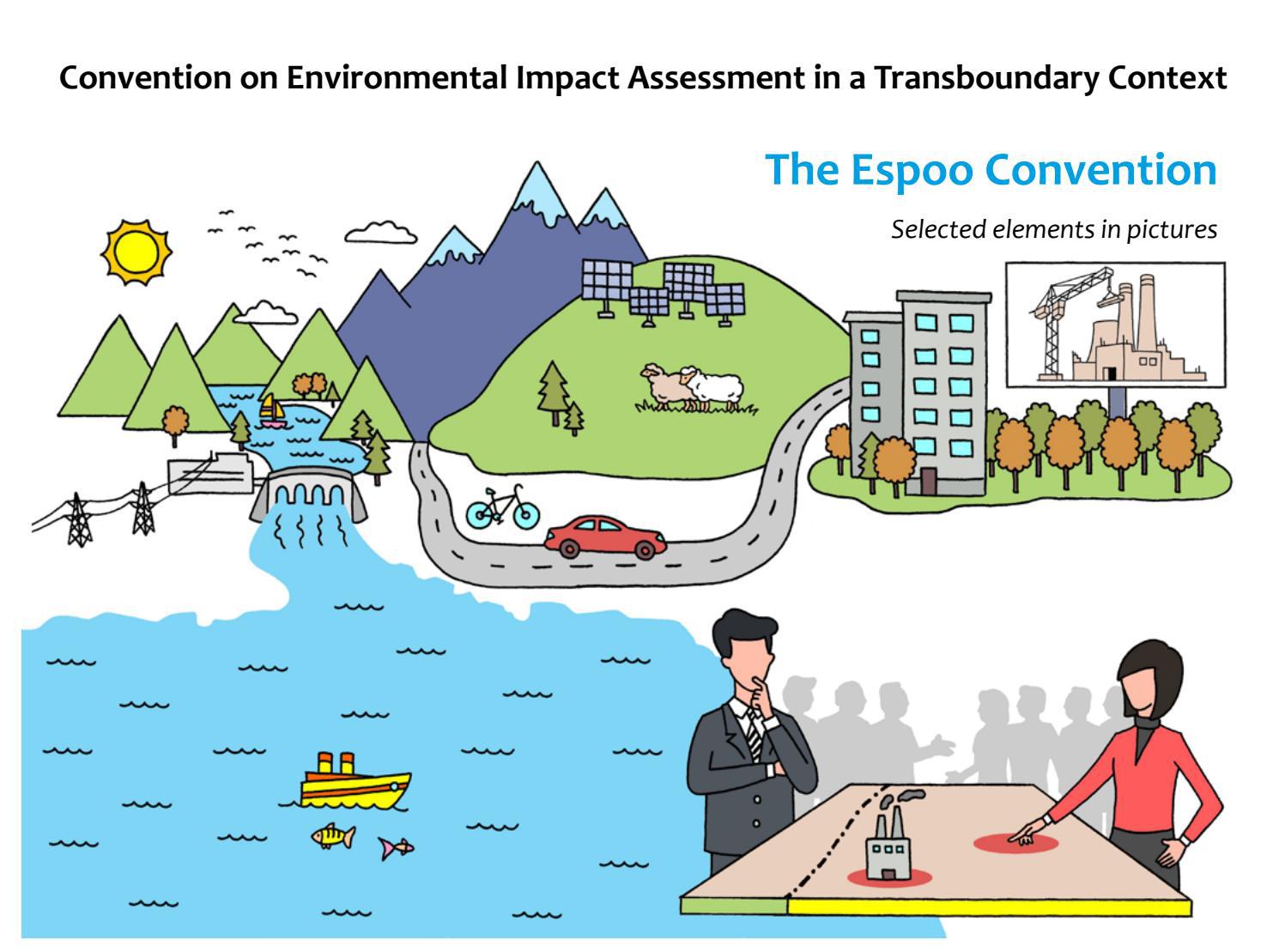
Ecological NGOs of Azerbaijan drew the attention of the relevant world structures to one more aspect of the problem created before our very eyes by the Armenian side. The statement noted that Armenia ignores the UN Sustainable Development Goals. There are 17 goals in total. 3rd is dedicated to health and well-being, 6th is dedicated to clean water and sanitation, 12th is dedicated to responsible consumption and production, 15th is dedicated to the conservation of terrestrial ecosystems. In 2022, at the 48th session of the UN Human Rights Council, the Council recognized for the first time that a clean, healthy and sustainable environment is an inalienable human right. Azerbaijani environmental activists also appealed to the government of the US, of which Bobby Singh Kang is a citizen, and called on the American side not to be silent, but to respond to violations of international norms and human rights by a company operating under the American flag. source
According to the UN Cartagena Protocol on Biosafety, changes related to the technologies for the production of industrial and mineral raw materials, regional planning, infrastructure work should not lead to the destruction of landscapes, their protection should be protected. Source
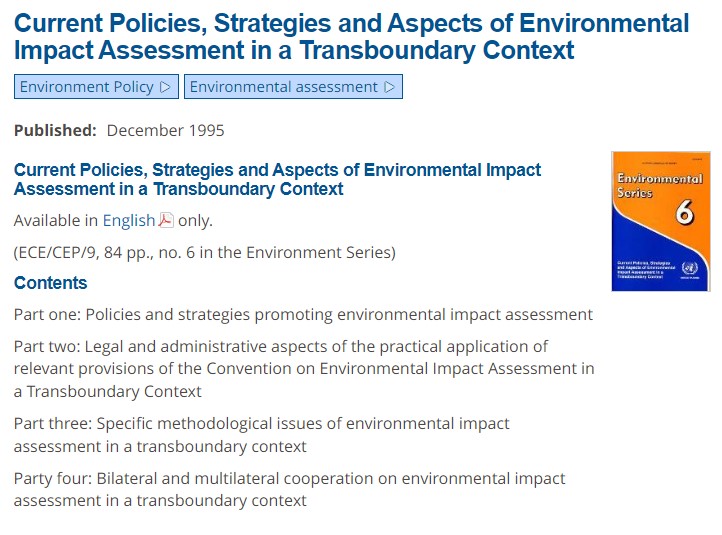
According to the "Convention on the Protection and Use of Transboundary Watercourses and International Lakes (Water Convention)" and the Protocol "On Water and Health" of the United Nations Economic Commission for Europe, the provision of water resources and the promotion of human health is one of the main conditions. Industrial and economic activities must not lead to undesirable consequences for the health and well-being of people who depend on these natural resources, and the protection of water resources is a fundamental responsibility of all parties. source
According to the "Stockholm Convention on Persistent Organic Pollutants", the use of chemicals that have a harmful effect on human health and the environment is strictly prohibited, and therefore all member countries that have acceded to the convention bear responsibility. source
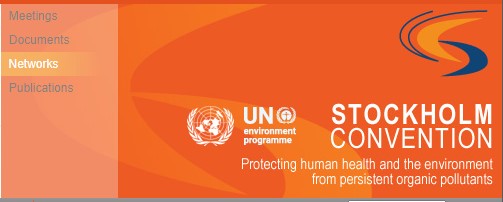
According to the "Basel Convention on the Control of Transboundary Movements of Hazardous Wastes and Their Disposal" of the United Nations Economic Commission for Europe and the "Convention on the Transboundary Effects of Industrial Accidents" of the United Nations Economic Commission for Europe, industrial activities must be carried out without harm to the environment and human health.
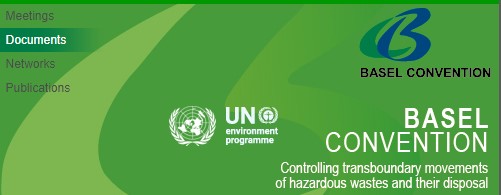
Thus, the existing conventions and protocols, decisions and other legal norms and principles of the UN Commission, the European Union confirm that Armenia does not adhere to international requirements when building this plant, but implements it without consultation with Azerbaijan. The international legal documents we have listed confirm that Armenia has committed another act of environmental terrorism, ignoring its obligations.
What made Armenia so “brave” and why did it make a statement that it would not take a single step back in the implementation of the project and was confident in itself?
First, the syndrome of international impunity. Although Armenia's Metsamor nuclear power plant dealt a devastating environmental blow to the region, it was not sanctioned by any international organization and no penalties were applied. At the same time, the fact that no international organization punished Armenia, which brutally exploited the natural and mineral resources of the Azerbaijani lands it once occupied, reassures the Yerevan government and tempts it to new economic and environmental crimes.
Secondly, the involvement of American investor Bobby Singh Kang, who has strong ties with pro-Armenian American congressmen and is the main shareholder of GTB STEEL, to finance the project. He has a business primarily in California and owns Salsan Steels Pvt Ltd., Prabal TMT, Hydraight Inc. and other companies with his brothers Baldev Kang and Sammy Kang.
He has extensive economic ties to California. And it is possible that the development of his multifaceted business is connected with partnership with pro-Armenian congressmen and governors, who have a strong political and administrative resource in this region.

Among his partners are Canadian businessmen, as well as the Delvarani Business family, who are of Iranian origin. Cargo Solutions Management, Llc, a California corporation, is a joint venture between the Kang and Delvarani families. Reference
One of their joint ventures, Dodo International Inc., has 50 joint stock companies in Canada. In this regard, the Canada-California connection should be considered primarily as a political transit, where the advantage of the Armenian lobby is ensured. Source With this in mind, we want to remind that there is a lot of economic and political support at the US-Canadian level for the construction of the Kanga Steel Plant, which has a fairly large financial network.
The third factor is US interests in the region. Washington's political intentions are not ruled out behind the ongoing economic project. If you approach it from the point of view of the West, which is trying to suppress the economic, political and military projects of Russia in the region, gradually capturing the industrial complexes of Armenia and strengthening its positions, in this regard, laying the foundations for investment plans in Armenia is more important for them than the environmental factor. Therefore, indifference to the environmental factor unties the hands of Yerevan.
Ecological organizations of Azerbaijan, civil society institutions, state and government organizations have a serious job to do.
The Ministry of Ecology and Natural Resources of Azerbaijan has already taken the first step in a June 7 statement stating that Armenia's construction of a metallurgical plant near the border with Azerbaijan does not comply with international legal norms and principles. The ministry warned that this illegal activity of Armenia has become a source of danger not only for Azerbaijan, but also for the ecological environment of the entire region, strongly condemning these actions, which are contrary to international law, and called on the international community to pay special attention to the problem. link
After the statement of the Ministry of Ecology and Natural Resources, the Armenian company GTB STEEL issued a response statement and practically stated that they would be committed to environmental genocide. Quote: “The owner of the smelter under construction is "GTB Steel" LLC, which applied in accordance with the RA legislation and received a positive conclusion on the impact on the environment from the national competent authority, the RA Ministry of Environment, with appropriate test requirements that meet all international standards. The conclusion confirmed that all modern technologies for the exclusion of negative impact on the environment will be implemented and all equivalent measures will be carried out. It should also be noted that the smelter is not in operation and is still under construction.
In addition to the foregoing, we inform that "GTB Steel" LLC will continue its activities in the border community of Yeraskh, which is so important for the Republic of Armenia, following all the requirements specified by the Armenian legislation, and for the benefit of the Republic of Armenia.
Perhaps, this is the reason for the reaction of the neighboring state. Despite of the above-mentioned actions with hostile motives, we are fully committed to continue our project in the border community of Yeraskh, which is highly important for the economy of the Republic of Armenia."

This statement once again shows that it has become commonplace for Armenia to violate international laws and norms, and it is impossible to speak with this country in an understandable language and explain international principles at the table.
There is only one way: to take measures against Armenia, which for almost 30 years keeping Azerbaijani territories under occupation, ignored UN resolutions, and resolutely force it to comply with the requirements of international conventions. Because the actions of the country, based on double standards and the deceit of the international community, leave no other way out, forcing Azerbaijan to take this step.





















